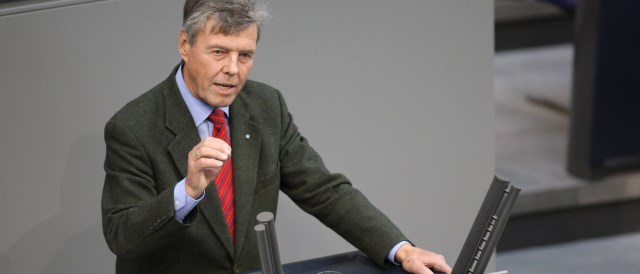Recently, our blogger Craig Morris stated that both coalition parties have capable proponents of renewables, but he only mentioned one from the Social Democrats. He says he left out the conservative CDU/CSU intentionally – because he was saving the best for last.

Josef Göppel, one of the CSU’s outspoken supporters of bottom-up renewables. (Photo by goeppel.de)
As an American, I always have trouble explaining the difference between the conservative sister parties CDU and CSU because there are so few similar examples in other countries to my knowledge. Essentially, the CDU is the popular right-of-center party known as the Christian Democrats. They are represented in all of Germany’s 16 states except for Bavaria, where the CSU – the Christian Social Union (see the Wikipedia entry for the history) – reigns supreme. The two parties agree not to enter each other’s territory, so the CDU does not run in Bavaria, and the CSU does not run outside Bavaria.
Essentially, imagine the Democratic or Republican party in the US being represented by a separate party in Texas, with the Texan party not leaving the Lone Star State. (No, this is nothing like the current split between the Republicans and the Tea Party.)
The two “C parties” (as they are referred to) often toe the same line, but just as often they disagree. One reason why the Green Party was not the favorite for coalition negotiations was a number of differences between it and the CSU; relations are a bit better with the CDU, and indeed a new coalition between the Greens and the Christian Democrats is now going up in the German state of Hesse.
Nonetheless, as a “people’s party” the CSU also represents a wide range of views, and Bavaria is a proud agricultural state as well. One major proponent of the energy transition – not just a switch to renewables, but a switch of ownership from corporations to citizens – is Josef Göppel (for an interview of our author Paul Hockenos with Josef Göppel earlier this year, click here), someone who helped establish the national organization representing energy cooperatives. He was one of only three CDU/CSU parliamentarians who voted against the new coalition agreement.
On his website, he explains (in German) that he could not support the agreement because “party leaders made some last-minute changes.” Specifically, he agrees with most in the renewables community that the growth corridor will slow down the transition; as he points out, Germany is currently expanding renewables beyond its current targets – which are not understood as limits anyway. The target for 2050 is “at least” 60 percent renewable energy and “at least” 80 percent renewable power.
Most interestingly, Göppel expresses concern about the new coalition making it difficult for wind power in southern Germany. Bavaria is currently the state with the most PV installed, but it and neighboring Baden-Württemberg are last when it comes to wind power capacity (aside from the three city-states of Bremen, Hamburg, and Berlin).
The North has the best wind resources, so this outcome is not surprising. However, there is a debate about whether it would be less expensive to expand wind turbines into areas with poor wind resources but sufficient space on the grid rather than putting up more turbines in the North, which would require costly grid expansion. One major difference is also potentially ownership; communities in the South could put up these scattered turbines themselves, whereas large wind farms in the North might be reserved for corporations arguing they can do it at the least expense (aside from grid concerns).
On his website, Göppel says he insisted that the coalition agreement include a stipulation that any reforms “must take account of citizens as small investors in projects and the planning.” It’s good to know that there are some politicians at the top who are still accountable to their constituents at home. Too many top politicians now believe that they serve their constituents by protecting Big Business, which is hurting at the moment – because business execs didn’t believe renewables could offset their conventional power this fast.
There is therefore a lot of talk about rising prices and potential blackouts, but not enough attention paid to the Energiewende that that has been going on since the 1970s in Germany. During the next coalition, those of us who support energy democracy will need to support politicians like Göppel as much as possible.
[vimeo]http://vimeo.com/70630420[/vimeo]
Craig Morris (@PPchef) is the lead author of German Energy Transition. He directs Petite Planète and writes every workday for Renewables International.